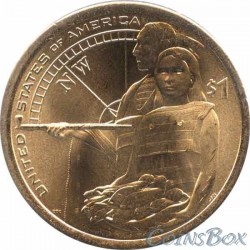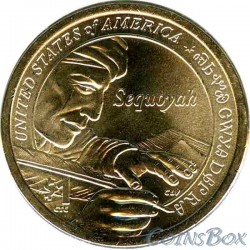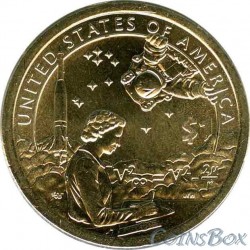No products
Product successfully added to your shopping cart
There are 0 items in your cart. There is 1 item in your cart.
Sacagawea
- Sets of coins
-
Coins
- Coins Russia and CIS
-
Europe
- EURO
- Austria
- England
- Belgium
- Germany
- Italy
- Spain
- Latvia
- Lithuania
- Estonia
- Luxembourg
- Portugal
- France
- Finland
- Cyprus
- Andorra
- Greece
- Netherlands
- Slovakia
- Slovenia
- Ukraine
- Belarus
- Sweden
- Poland
- Norway
- Denmark
- Ireland
- Iceland
- Switzerland
- Monaco
- Liechtenstein
- Bulgaria
- Hungary
- Moldova
- Romania
- Czech
- Vatican
- Albania
- Bosnia and Herzegovina
- Macedonia
- Malta
- San Marino
- Serbia
- Croatia
- Montenegro
- Turkey
- Kazakhstan
- Transnistria
- Scotland
- Gibraltar
- North America
- South America
- Australia and South Pacific
- Africa
- Asia
- Tokens
- Silver
- Accessories
- Sochi 2014
- Banknotes
- Sale
- Marriages and species
- Sundry
Top sellers
-

-

-

Official set of series Russian Federation. Issue 11
Official set of series "Russian Federation". Issue 11
4 650 руб -

100 RUB Sochi 2014
680 руб -

-

-

10 kopeck 2015 MMD
7 руб -

-

1 Dollar First Patent 2018
250 руб -

Official set of series Russian Federation. Issue 12
Official set of series "Russian Federation". Issue 11
5 350 руб
No supplier
Viewed products
1 Sakagavea Dollar Elizabeth Peratrovich 2020
Data sheet
| Depth | 2 |
| Weight | 8,1 |
| Diameter (mm) | 26,5 |
| Material | a manganese-copper plated brass |
| Edge of the coin (milling) | with an inscription |
| Series | Outstanding events and people |
| Country | USA |
| Release date | 2020 |
| Quality | UNC |
Warning: Last items in stock!
More info
1 Sakagavea Dollar (Indiana), Elizabeth Peratrovich and the Anti-Discrimination Act of 1945. 2020 year.
Elizabeth Peratrovich (born Elizabeth Jane Wanamaker; July 4, 1911, Petersburg, Alaska, USA - December 1, 1958, Juneau, Alaska, USA) - representative of the Tlingit people, advocate for rights Alaska Native People.
Thanks to the active work of the human rights activist, the Anti-Discrimination Act, the first anti-discrimination law in the United States, was passed in Alaska in 1945.
Born in St. Petersburg on the island of Mitkova in the Alexander Archipelago on July 4, 1911. On the mother's side, she was a member of the Tlingit clan Lukash-adi in the Raven family. Andrew and Mary Wonamakers, who adopted it, were also Tlingit. Andrew served as a preacher at the Presbyterian Church. Childhood Elizabeth Jane passed with foster parents in Petersburg and Ketchikan. She studied at Sheldon Jackson's private college in Sitka and Western College of Education in Bellingham, Washington (now the college is part of West Washington University).
On December 15, 1931, Elizabeth married the Tlingit Roy Peratrovich (1908-1989), who worked at a cannery in Washington state. They lived in the town of Klook.
Three children were born in the marriage - two sons, Roy Jr. and Frank-Allen, and daughter Loretta Maria. Seeking great opportunities for themselves and their children, they moved to Juneau, where they faced social and racial discrimination against indigenous people. Elizabeth, as the head of the Presbyterian "Sisterhood of Alaska Native Women", began the struggle for Aboriginal rights, the result of which was an anti-discrimination law adopted in Alaska in 1945.
Peratrovichi later moved to Antigonish, Nova Scotia in Canada, where Roy defended his economics degree at St. Francis Xavier University. From there, they moved to Denver, Colorado, where Roy studied at the University of Denver. In the 1950s, the family moved to Oklahoma and then returned to Alaska.
Elizabeth Peratrovich died of cancer on December 1, 1958. She was buried in Evergreen Cemetery in Juneau.
In 1941, while living in the city of Juneau, the Peratrovichi family faced racial discrimination. Due to their affiliation with Alaska Natives, they were denied the right to rent decent housing, children were denied good education, and access to public places such as restaurants and movie theaters was restricted. Peratrovichi appealed to the territorial governor, Ernest Greening, on the adoption of a law banning public signs in Alaska with a sign that says "No entry for animals and Indians." In 1943, the bill against discrimination against indigenous peoples of Alaska was adopted by the territorial House of Representatives: 19 members voted in favor, 5 voted against.
In 1945, a debate took place in the territorial Senate about the law. Senator Allen Shattack spoke particularly sharply, who said: “Races must stay away from each other. Who are these people who have recently come out of savagery, who want to associate themselves with us, with whites, behind whom there is a five-thousand-year-old written civilization? ” Speaking last, Elizabeth answered him: “I did not think that I, who had recently come out of savagery, would have to remind the gentlemen, behind whom the five-thousand-year-old written civilization, about our Bill of Rights.” Her passionate speech had an effect: 11 members voted in favor, 5 - against. The bill was signed by the governor.
On February 6, 1988, the Alaskan Legislature announced February 16, the day on which the Anti-Discrimination Act was signed in 1945 as Elizabeth Peratrovich’s Day.
Obverse: depicts a portrait of a holding Sakagawa child, a Shoshone girl who helped expedition Lewis and Clark. Top inscription: Liberty (left), left inscription: In God We Trust (right), right: year of issue and mint mark.
Reverse: In the center is a portrait of Elizabeth Peratrovich, whose propaganda was considered a decisive factor in passing the 1945 Anti-Discrimination Law in the Alaskan territorial government. In the foreground is a symbol of the Tlingit Crow, of which she was a member. The coin face value is minted in the center right - $ 1. On the edge of the coin in a semicircle are inscriptions: at the top - the name of the issuing country: "UNITED STATES OF AMERICA", at the bottom the name of the coin - "ANTI-DISCRIMINATION LAW OF 1945"
Edge: Smooth with the inscription (* In God We Trust * E Pluribus Unum * year of minting and the mint stamp).
Release Date: 02/12/2020
















